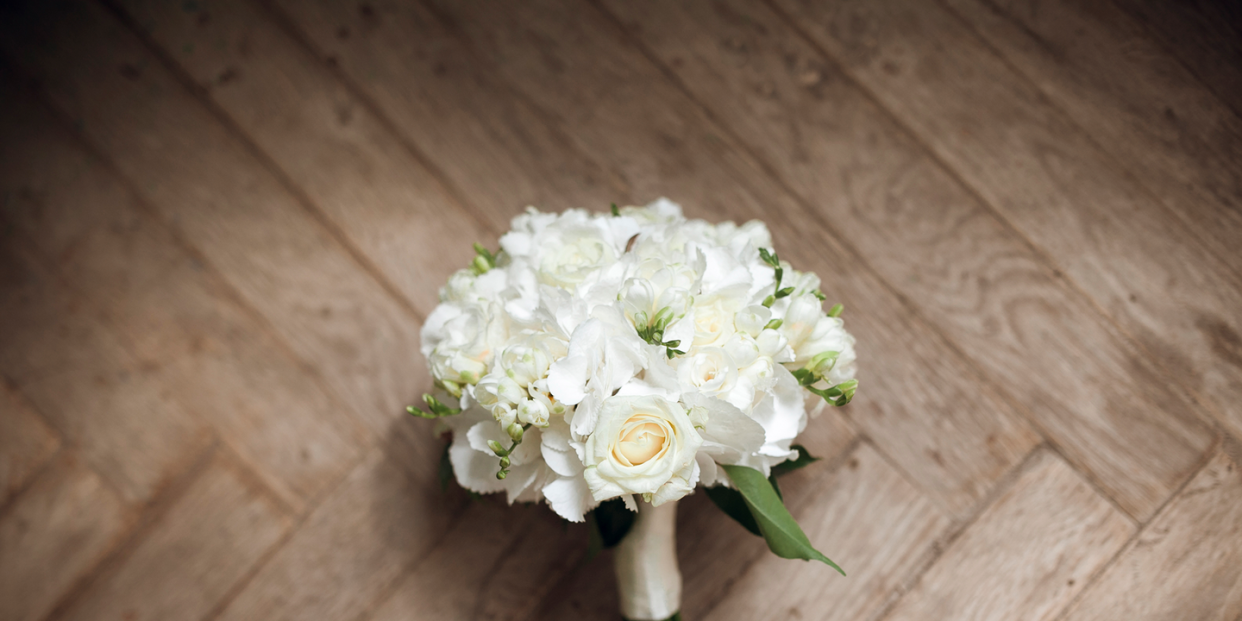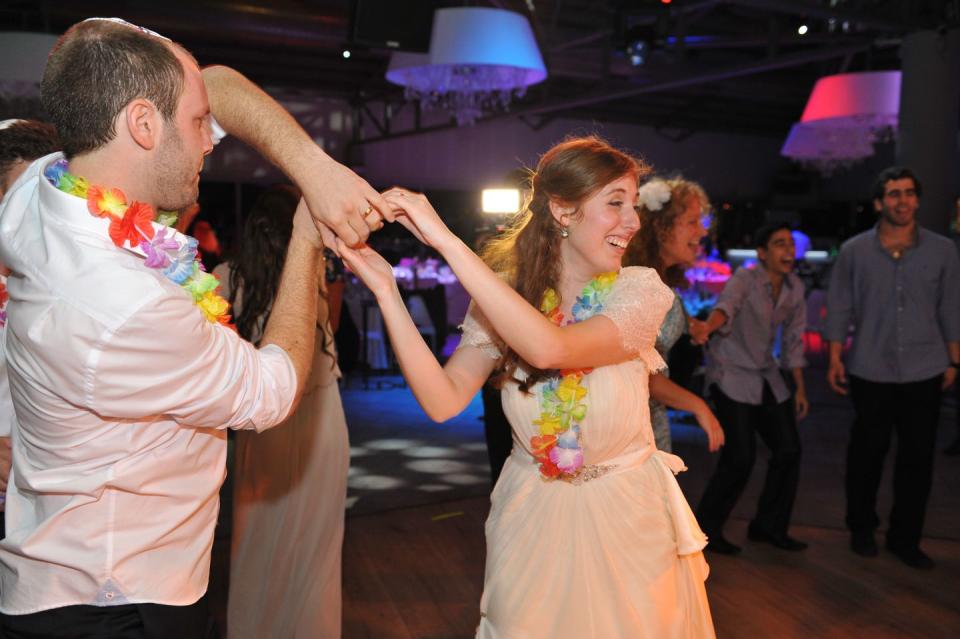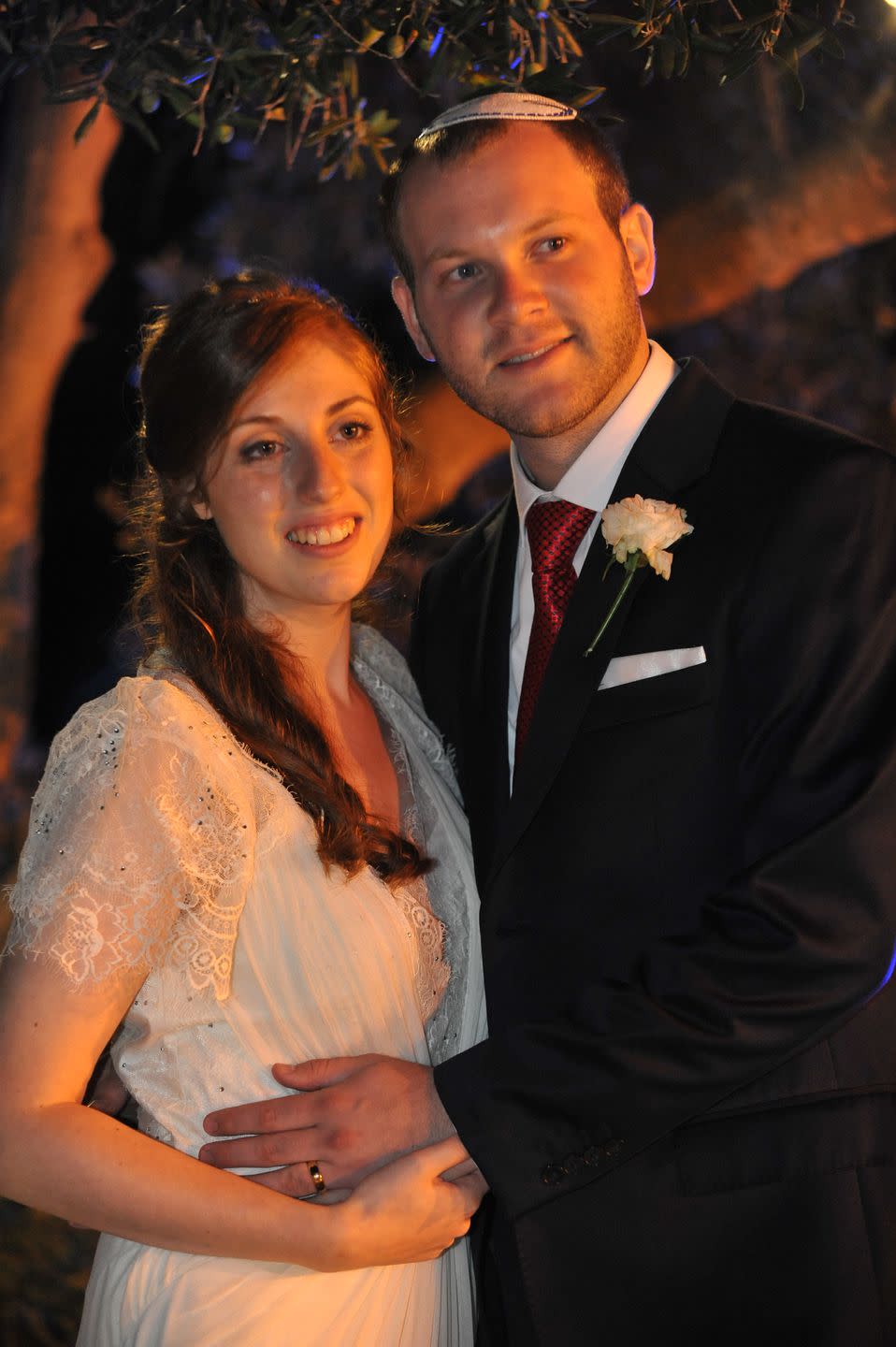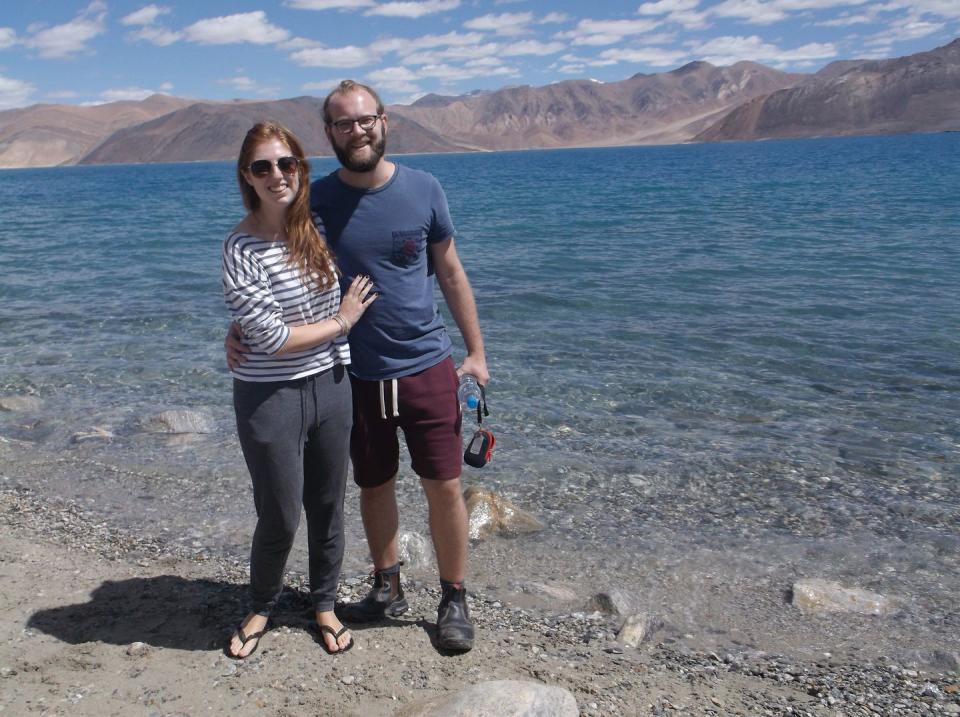My Bad Wedding Was the Best Thing to Happen to My Marriage

My stomach began to churn as my nails were splashed with a coat of peach polish the day before my wedding. Hours later, I gripped the sides of a toilet bowl and miserably told my family to leave for our rehearsal dinner without me. As so many have infuriatingly suggested since, this was not "due to nerves." Marrying my husband was the easiest, most obvious choice I’ve ever made. I just had a stomach virus. A very poorly timed one, at that.
The following day I went through the motions, wearing my white dress, dancing the hora, and being tossed up on a chair, but my mind was elsewhere. I was in survival mode, focussed on a single objective: don't projectile vomit over guests.

This outweighed all other wedding-related duties, like actually sipping wine under the wedding canopy (sorry, Rabbi!). In fact, I didn’t dare consume anything but water, though everyone was raving about the food.
This might explain why I started to feel horribly queasy during my husband’s speech when, instead of basking in his declarations of love, my brain was in overdrive, strategizing the quickest escape route to the bathroom. Thankfully, the nausea subsided after a bout of frantic prayers and some deep breathing, and perhaps due to the rush of adrenaline, I felt much better afterwards. I was even able to dance the remainder of the evening away-though not with my usual fervour.

“Wasn’t that amazing?” my brand-new husband gushed, as we retired to our fancy hotel room. I didn’t want to be a party pooper and I knew that, objectively, our wedding had been amazing-the ceremony was set against a perfect sunset, our guests stayed long into the night, the flower arrangements were impeccable. So I didn’t say what I actually thought which was No, not really. As I climbed into bed, feverish and exhausted, I wondered what crimes I committed in a past life to deserve such a fate.
I’m a classic people pleaser, and I quickly discovered that the worst part of a bad wedding isn’t suffering through the event itself-it’s talking about it afterward. I was so afraid of disappointing people that I waited a year to confess that my wedding was not the best day of my life. The toughest audience was my engaged friends; I felt like a traitor when I failed to regale them with the glamorous, romantic anecdotes they’d been taught to expect by bridal magazines, Disney, and Say Yes to the Dress.
Sociologist Chrys Ingraham coins this sort of expectation the “wedding-industrial complex," claiming that the wedding industry’s sole motivation is financial gain, so they attribute a fairytale ending to extravagant, white weddings.
This cynicism ruffles me. Not just because I’m a recreational watcher of Say Yes to the Dress, but I leaned into this "industrial complex" when I hired a wedding planner, and I've never regretted it.
Debbie Nussbaum, who managed stressful logistics, menial details, and unforeseen issues so our wedding party didn’t have to, was a huge help. I posed Ingraham’s theory to Debbie. She admitted that while she's financially motivated (and there's nothing wrong with that), she also finds being there for her clients during their personal, pivotal life moments "very rewarding." Far more so than her previous law career.
People trying to earn a living, like Nussbaum, aren't perpetuating the wedding-industrial complex. Pop culture’s unwavering focus on the wedding day is. When what happens after the big party is so rarely depicted, it infers that there’s nothing of note once the prince puts a ring on it. Perhaps this is why I spent a year preparing for my wedding, but it didn't even occur to me to prepare for my marriage.
My husband and I have enjoyed five wonderful years of marriage together, and I hope there are many more to come. But our first year as man and wife wasn’t easy. It was filled with many slammed doors and frustrated tears as we worked out how to communicate through exhaustion and stress, how to approach sex after the honeymoon period, and how to prioritize each other and ourselves.
I consulted Sarah Halpern, a Marriage and Family therapist, for advice on better-navigating marriage growing pains. Halpern assured me that maintaining physical contact-like hugging six times a day-“can shift things dramatically.” So I decided to try it out for myself. In moments I’d usually bristle at the suggestion of physical contact (triggered usually by work stress, PMS, etc.), I’ve noticed that, once I’ve softened into the hug, it’s remarkable how much calmer and kinder I start to feel.
Halpern also flagged the “toxic” perils of social media, especially comparing your wedding or marriage to others'. Nussbaum, too, has noticed that pressure on brides has evolved in the last four years. “Nowadays, clients spend months planning every cute little extra detail, so they can post photos on Instagram the next day," she said.
I’ve seen first-hand how focussing on Pinterest-perfect weddings with photos that belong in a glossy magazine can foster a fierce game of one-upmanship. Just last week a Facebook friend shared a memory depicting their proposal with the caption "can’t believe it’s been a year since I got 1,300 likes on a picture!!” We are, I believe, in real danger of missing the point.
And the point is, of course, that a beautiful wedding does not necessarily lead to a beautiful marriage. I can also attest that a bad wedding doesn't lead to a bad marriage, either.
In many ways, a sucky wedding was the best thing to happen to my marriage; if I’d had the perfect day, I fear it would all have gone downhill from there. Instead, I skipped the post-wedding blues and, as soon as I could stomach solid foods, set about investing in my marriage itself. You know, the rest-of-our-lives part. And? So far, so good!

My advice to brides-to-be: I’d like to make an argument for going back to basics-for small, humble celebrations which won’t disappoint you if they don’t go to plan. For appreciating the little things, and for working hard on the big things, and accepting that however you choose to mark life’s milestones, they do not dictate the path that lies ahead.
For more ways to live your best life plus all things Oprah, sign up for our newsletter!

